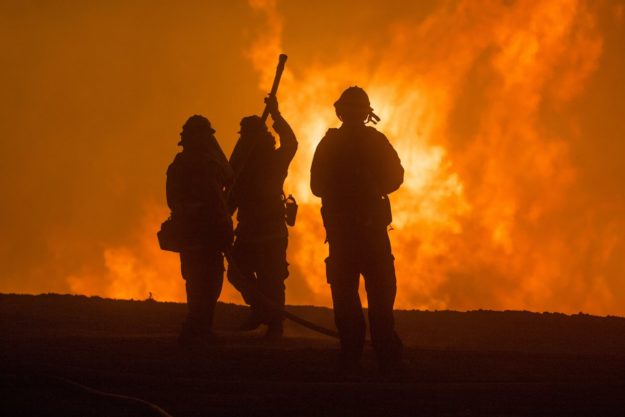Widgetized Section
Go to Admin » Appearance » Widgets » and move Gabfire Widget: Social into that MastheadOverlay zone
Biden: ‘Threat of Western wildfires this year is as severe as it’s ever been’

For years, American presidents have held annual meetings with Federal Emergency Management Agency officials to plan ahead for the Atlantic hurricane season. In an era when the catastrophic impacts of climate change are accelerating from coast to coast, President Joe Biden last week convened a first-of-its-kind meeting to make similar preparations for what is shaping up to be another devastating wildfire season in the West.
“We know this is becoming a regular cycle, and we know it’s getting worse,” Biden said in a meeting with Cabinet officials at the White House, as well as with Western governors and private-sector leaders who joined virtually. “The threat of Western wildfires this year is as severe as it’s ever been.”
More than 1 million acres have burned across 12 Western states so far this year, according to estimates from the National Interagency Fire Center. In Arizona, the Telegraph Fire has burned more than 193,000 acres and destroyed or damaged at least 52 structures, while several large fires have forced closures and evacuations across central Colorado.
California Gov. Gavin Newsom joined Wednesday’s meeting from the Klamath National Forest in Siskiyou County, where the rapid growth of the Lava Fire and the Tenant Fire has prompted widespread evacuations in the area. The latest California blazes come a year after wildfires caused more than 33 deaths and burned nearly 4.4 million acres in the state’s worst fire season on record — and amid fears that 2021 could prove just as dangerous, or worse.
“These realities are here with us today,” Newsom said. “We have to have a sense of intentionality and responsibility, to radically change our vegetation and forest-management policies, our suppression policies, our pre-positioning policies.”
The Biden administration announced a series of actions on June 30 to expand the federal government’s wildfire response and prevention capabilities, including additional aviation resources and the deployment of satellite-based early-detection technology, as well as FEMA grants for wildfire risk-mitigation projects and other prevention efforts. Biden also announced plans to award bonuses and incentives to wildland firefighters in an effort to increase pay and improve recruitment and retention as federal firefighting crews aim to staff up for longer, more intense fire seasons.
“The truth is we’re playing catch-up,” Biden said. “This is an area that has been under-resourced, but that’s going to change.”
Remarks from Biden, Newsom, Vice President Kamala Harris and Oregon Gov. Kate Brown were livestreamed from the White House, after which the meeting continued in a closed-door session, according to a pool report.
The NIFC announced last week that it had upgraded to National Preparedness Level 4 for the first time since 2012, indicating that multiple large, complex fires are “competing for wildland fire suppression resources.” The agency’s Predictive Services Center continues to forecast above-normal “significant wildland fire potential” across much of the West from July through September.
Extreme drought conditions have extended across much of the Southwest throughout the spring, according to the U.S. Drought Monitor — part of a 20-year “megadrought” that scientists say is the region’s worst dry spell since the 16th century and driven in large part by higher temperatures caused by climate change. Record-shattering heat waves in Colorado, Utah and the Pacific Northwest have also exacerbated fire dangers.
“With climate change driving the dangerous confluence of extreme heat and prolonged drought, we’re seeing wildfires of greater intensity, that move with more speed, and last well beyond the traditional months of the fire season,” Biden said.
Other attendees of last week’s briefing included Colorado Gov. Jared Polis, New Mexico Gov. Michelle Lujan Grisham and two Republicans, Gov. Spencer Cox of Utah and Gov. Mark Gordon of Wyoming. Two other Western GOP governors, Gov. Greg Gianforte of Montana and Gov. Brad Little of Idaho, “weren’t invited to the table,” Gianforte claimed on Twitter on Wednesday.
Western governors met with senior administration officials last week at the annual meeting of the bipartisan Western Governors’ Association. Brown, the WGA’s chair, applauded the administration’s efforts to bolster federal support for Western states dealing with the impact of unprecedented fire activity.
“Our local communities are increasingly challenged to respond on their own to disasters of the scales we are seeing,” Brown said. “More resources to collaborate and provide … comprehensive, collective efforts to reduce wildfire risk would be extremely helpful.”
Editor’s note: This story first appeared on Colorado Newsline, which is part of States Newsroom, a network of news outlets supported by grants and a coalition of donors as a 501c(3) public charity. Colorado Newsline maintains editorial independence. Contact Editor Quentin Young for questions: info@coloradonewsline.com. Follow Colorado Newsline on Facebook and Twitter.
Chase Woodruff
Latest posts by Chase Woodruff (see all)
- Evans, Boebert defend Medicaid cuts as protesters shout them down in Denver - May 30, 2025
- Colorado officials envision Mountain Rail by 2026, Denver to Boulder to Fort Collins by 2029 - May 19, 2025
- Colorado’s Evans votes in favor of bill that will kick at least 7.6 million people off Medicaid coverage - May 15, 2025


